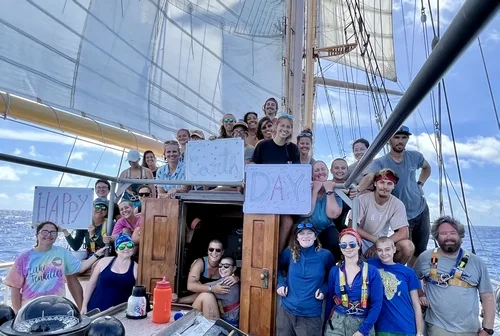Programs Blog
Fun in the ITCZ

April 25, 2023
Cate Humphries, C Watch, Barnard College
Ship’s Log
Noon Position
5°38.6’ N, 148°15.1’ W
Ship Heading
320°PSC/325°T
Ship Speed
5.3 knots
Taffrail Log
2041 nautical miles
Weather / Wind / Sail Plan
Sailing on a stbd tack under a shallow reefed main, the fore and main stays’ls, and the jib. Winds gusting 18 knots at 085°T, sea state 5’ ENE, clouds fillingin with some low alto-cumulus/stratus.
Description of location
Halfway between the Marquesas and Hawaii (the middle of the Pacific Ocean)
C watch had dawn watch this morning and it was, as many dawn watches are, the source of much entertainment for the watch-standers. One often finds that during the hours of 0100-0700 the little things often bring the most excitement and laughter. While potentially a little out of context for those who got a full night’s sleep last night, here are a few of the things that we relayed to our friends on other watches this morning:– Olivia (3rd Mate) got hit by a flying fish during the watch rotation at 0100. Olivia is okay but the fish didn’t make it and has instead donated its body to science. Rest In peace, the lab thanks you for your sacrifice.– The sea state was pretty rough last night and while standing lookout up at the bow, Jack was drenched head to toe by a surprise wave.– A tern took over the science deck and hopped about for a few hours before flying away (though not without leaving a bit of a mess for the afternoon deck-washers).Besides the small joys of dawn watch, there is some excitement on board for another reason… we found the ITCZ! After a few days of uncertainty, with weather reports seemingly unable to find it, we sailed right into the thick of it yesterday. Feeling pretty good about sleuthing out this rather large and theoretically hard to-miss weather pattern gave us the confidence we needed to battle the squalls that it brought us over the past couple days. We seem to have made it through the worst of it now and C watch got to prepare a deck report this morning to teach the rest of the crew about what it is. Here’s a little taster for all of you back home:The ITCZ, or intertropical convergence zone, is the region where the north and south wind systems converge. It is generally located just north of the equator, particularly in oceanic regions, due to the heat capacity of the ocean and the fact that there is more landmass in the northern hemisphere vs. the southern. The ITCZ causes rainy, squally weather due to the extreme upward movement of moist air. This causes huge cumulonimbus clouds to form, bringing with them lots of rain. The convergence of the two major wind systems also means that winds within the area can be quite variable, which is something we keep a close eye on as sailors.
Currently feeling very grateful to my foul-weather gear and also to the stewards for bagel breakfast this morning!I hope everyone back home is doing well! We miss you!
https://sea.edu/wp-content/uploads/2023/04/25-apr-photo-1_small.jpghttps://sea.edu/wp-content/uploads/2023/04/25-apr-photo-2_small.jpg
Recent Posts from the Ships
- Ocean Classroom 2024-A collaborative high school program with Proctor Academy
- Collaborations and Long-term Commitments: SEA’s Caribbean Reef Program Sets a Course for Coastal Programs that Compliment Shipboard Experiences.
- Sea Education Association students prepare for life underway using state of the art nautical simulation from Wartsila Corporation.
- SEA Writer 2022, Magazines From the Summer SEA Quest Students
- Technology@SEA: Upgrades Allow Insight into Ocean Depths
Programs
- Gap Year
- Ocean Exploration
- High School
- Science at SEA
- SEA Expedition
- SEAScape
- Pre-College
- Proctor Ocean Classroom
- Protecting the Phoenix Islands
- SPICE
- Stanford@SEA
- Undergraduate
- Climate and Society
- Climate Change and Coastal Resilience
- Coral Reef Conservation
- Marine Biodiversity and Conservation
- MBL
- Ocean Exploration: Plastics
- Ocean Policy: Marine Protected Areas
- Oceans and Climate
- Pacific Reef Expedition
- The Global Ocean: Hawai'i
- The Global Ocean: New Zealand